Politics
Presidential primaries (1) APC, Tinubu and others
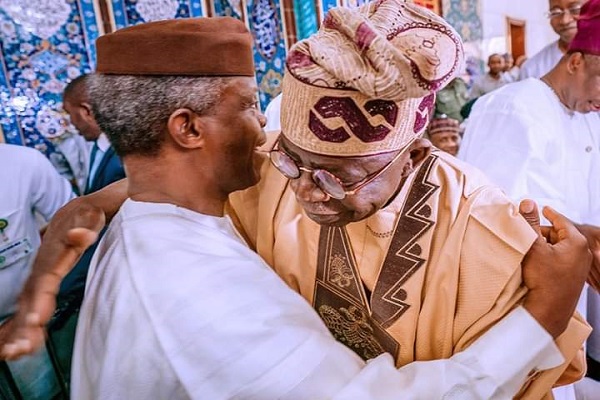
IN approximately one month, the two leading political parties will know who will fly their flags at the next presidential election. So far, however, it is burdensome trying to manage the process of determining how to zone the presidency between North and South, and then finally selecting one out of their many qualified aspirants to fly their flags. The job is clearly not an easy one for both parties. By last weekend, more than 30 aspirants had crowded the two parties to voice their interest in the plum, imperial job of ruling Nigeria. The number may be disconcerting, but the consolation is that little by little, more educated and talented people are showing interest in the job. Whether their parties, which have put laborious mechanisms in place to screen presidential aspirants, can attest to the leadership character of the aspirants is a different thing altogether. But even after the candidates are picked, the parties will still have a hard time selling their standard-bearers to voters wearied by decades of leadership incompetence.
The ruling All Progressives Congress (APC), which for no special reason other than incumbency is the frontrunner, boasts of more than a dozen aspirants, clearly incommensurate with the 40 million membership size it purports to have registered last year. The main opposition Peoples Democratic Party (PDP), still apoplectic from its two last defeats, has nearly 20 aspirants, thus matching its previous boast of being the largest political party in Africa. By the end of May or early June, both parties will have put their aspirants, save one each, to the sword based on sundry reasons. The manner of the slaughter and the scale of the massacre will determine whether the disaffection arising from the selection processes would prove damaging and consequential to the ambitions of both parties. Having both produced a slew of unprincipled leaders and aspirants over the years, the culmination of the selection processes will create and invigorate an osmotic environment manifesting in a current of bitter and migrating rejects, and an array of eager dupes and saboteurs who would stay behind to wreak havoc on their parties for spurning their messianic offers.
For obvious reasons, it is apposite to consider the APC first, not only for being the party to beat despite its puny show of competence, but because it has produced more consequential aspirants. The one dozen or so APC aspirants are a motley crew of inscrutable politicians whose interests in the presidency, judging from their poor or modest showing as governors or senators, is hard to deconstruct. Of the dozen and probably more aspirants who will declare before deadlines lapse, one region demands closer examination, while two politicians are worthy of any proper attention. Reviled as the party may be, it still possesses some modicum of common sense. It recognises that after eight years of President Muhammadu Buhari, it would be scandalous to openly romanticise northern aspiration to the throne. They may waffle a lot about zoning, but in the end they know that by the sheer mechanics of how they have alloted party offices they seem to have made zoning the presidency not only ineluctable, but also southern-ward. More decipherable, it seems they are looking in the direction of the Southwest; but whether enthusiastically or reluctantly, no one can tell at the moment.
The wink on the party’s face has, therefore, proliferated aspirants from the Southwest, including ex-Lagos State governor Bola Ahmed Tinubu, Vice President Yemi Osinbajo, senator and ex-governor Ibikunle Amosun, and Governor Kayode Fayemi who last week served notice of his declaration in a few days. Aspirants from the South-South and Southeast, including the pampered ex-Rivers governor Rotimi Amaechi and the theatrical Labour minister Chris Ngige, are having to move mountains to convince anyone of the seriousness of their aspirations or the likelihood of being selected. Of the four Southwest aspirants, Sen Amosun and Dr Fayemi are unlikely to go the distance. They will pant for breath even in the sprints. The race then seems to be between Asiwaju Tinubu and Prof Osinbajo. If the design among shadowy forces within the party is not to populate the contest with Southwest aspirants to drain support from the ex-Lagos governor, then the contest can be safely narrowed down to the two. Here, Prof Osinbajo is less likely to breast the tape. After first running the race as if he was already a candidate fighting against the PDP pick, he has sensibly redirected his efforts into fishing for delegates. After all, it is evident not all delegates have been bought or sold.
In his fishing trips, and at every stop, the eminent professor has run on his record as a loyal subordinate to the president, from whom, due to delegation of duties, he has learnt the intricacies of governance and gained experience. It is not clear whether he knew how implausible he sounded every time he made such claims, but the records he alluded to rang hollow and even apocalyptic to his teeming supporters. They brush aside his highfalutin vice presidential claims, preferring instead to focus on his academic and professorial qualifications, and more believably his mesmerising eloquence which they noisily contrast with the stolid and laborious phrases and elocutions of his opponents. The more the professor speaks of the value and virtue of his joint leadership with President Buhari, the more his dismayed and sceptical supporters shift attention to his eloquent forays into polemic and explosion of his opponents’ casuistries. Being sensible and intellectually deep, the vice president knows that eloquence without substance, which his instinct tells him sums up his profundities, is meaningless. But being impatient and alarmed, his supporters know that it is catastrophic and delusional for any aspirant to leash himself with a controversial and scorned president. There will be no meeting point between followers and leader, for each is convinced that the other is grossly mistaken.
Prof Osinbajo is unlikely to win the ticket, of course not in the unequivocal sense in which Sen Amosun and Dr Fayemi will lose their deposit, for their aim in contesting the party’s ticket is shrouded in mystery. The vice president wants to win, and even thinks he can win, despite not having built a political structure, as politics in this clime demands. It would be tragic should he believe that President Buhari had done well, necessitating his willingness to attach himself to his illusory records. But he is too timid to distance himself from the president, and has even begun to man up in his rhetoric, walking back many of his assumptions including how he became vice president. Mercifully the contest for the ticket will last only four weeks or so. Should it last longer, there is no telling what other stories and accounts the eminent professor would repudiate. His Pentecostal fervor as a function of his political ambition has not abated; and despite clashing with the doctrinal messianism of Tunde Bakare, pastor of the Citadel Global Church, pulling God into the race on behalf of ‘a man for such a time as this’ will be the natural order of things in his increasingly less obtrusive religionisation of the 2023 race.
Sen Amosun and Dr Fayemi probably have two purposes for vying for the ticket: either to use the aspiration as a future bargaining tool after they might have lost, or to take advantage of the dark horse phenomenon replete with Nigerian politics. Recall how Timipre Sylva became governor, and how Goodluck Jonathan himself became governor and president in quick and bedazzling succession. But Prof Osinbajo has the support of shadowy northern characters close to the corridors of power. They know he can’t win, not even by default, and they know for sure that should he win, it would amount to simply gifting the presidency to the PDP. Despite their hallucinations, the professor’s northern backers know that the northern (that is, the core North) voter less hamstrung by the niceties of education and enlightened self-interest has a morbid fear of pastors, particularly their southern Pentecostal cousins. Should he get the ticket, they know that the dark hint of religion already polluting the race will break out into open, undisguised, and unashamed warfare.
The APC itself is in a quandary. Despite the aloofness of the president, who believes whether the party wins or loses will not significantly affect him, most of its leaders wish to retain the presidency in the party. They do not have powerful northern contestants for their ticket like the PDP. They will, therefore, want to put their best southern foot forward. In their closets, they have already precluded any pastor as candidate, and would in fact gloat should they get a Muslim- Muslim ticket into the bargain. They will not rig the votes for the professor, and will not stake a higher bargain for dark horses so-called. In the end, they will be deliberate, watch the PDP’s every move, no matter how surreptitious, and despite their frenzied politicking and disputatious manners, will be averse to pulling anybody’s chestnuts out of the fire. Soon, in fact, party leaders will realise that the decision on their standard-bearer had been taken months ago, notwithstanding the valiant efforts of their former caretaker chairman to alter the outcomes.
That perhaps leaves Asiwaju Tinubu for consideration. Despite himself and his best efforts, he is and remains controversial. More than any individual, he worked hardest to cobble together the persons and forces that coalesced into the APC, and performed valiantly to put the party and particularly President Buhari in office. For a single south-westerner to pack such political muscle appeared humbling, if not unsettling and humiliating, to the president and those who think oligarchical like him. As soon as the crown settled around the president’s ears, he and his close aides produced a series of measures to cage the former Lagos governor. They were partially successful. But their effort to raise a new set of Southwest political titans failed to take heed of the gradualist approach to mentoring, toughening and maturing political leaders. Aware that their reelection was in jeopardy in 2019, they exhumed him again from pasture and made him the face of the campaign. Immediately they won, as Asiwaju Tinubu and his supporters half expected, he was again promptly consigned to the cold. Party leaders, beginning with the defunct caretaker committee, are indescribably mortified to begin to sense that they can’t win the presidency in 2023 without him, either as the standard-bearer or lead campaigner.
But while he was put out to pasture, Asiwaju Tinubu continued nurturing his contacts and servicing his political network. This nature is intrinsic to his politics. He gives much, expects little, and had offered political and pro-democracy services for decades even before running for the presidency crossed his mind. But to win the ticket he will have to stare down the opposition within the party leadership, starting with the president whom he must either pacify or cleverly bypass. The caretaker committee did their best, in league with Aso Villa cabals, to undo him and neutralise his political influence and stature. They were unsuccessful, just as the president whose antipathy to him waxed alternately hot and cold also achieved mixed results. The main reason they are loth to give him the ticket he believes he has worked hard for and richly deserves is because they see him as a man who has a mind of his own. They are uncomfortable with a president who would not be dictated to, for the Nigerian presidency, as past presidents and heads of state as well as ex-president Olusegun Obasanjo have demonstrated, is fit only for the pliant.
Joined by a large section of the public, party leaders emphasise Asiwaju Tinubu’s weaknesses and humble background than his accomplishments and competence. He is criminalised for his humble birth, denounced for counterintuitively deploying the Chinese model of mentoring next generation of leaders that focuses on competence rather than loyalty, and dismissed as a certificate forger despite his alma mater’s incontrovertible attestation. In the 2015 poll, he was the main target despite not being the candidate, and in 2019 he was pilloried for helping his party win a second term despite being resoundingly ostracised by his party. Now they fear him for having a remarkable administrative record in Lagos, for being strong-willed, for being capable of producing the next generation of leaders, and for being able to grasp complex social, economic and political issues. Deploying the illogical postulations of ex-military heads of state who fix the arbitrary age limit of 60 for the next president, the former governor is waved away as too old at 70. His strengths and skills are downplayed, and his weaknesses accentuated and valorised. Yet, the PDP knows that the only aspirant they fear to face as candidate is Asiwaju Tinubu. It is unclear whether the president or his party, the APC, knows this.
Before him, Chief Obafemi Awolowo was demonised as independent-minded and strong-willed, not to say power-hungry and dictatorial. France’s Charles de Gaulle was also scorned as being too obsessed with power when he advocated a new constitution shortly after World War II. Deng Xiaoping, who laid the foundation for modern China, was purged from leadership sometime between 1967 and 1969 during the Cultural Revolution, reinstated by Zhou Enlai four years later, purged again in 1976, and restored by Hua Guofeng in 1977 until he finally took the reins of power a few years later. Men with ideas may have their weaknesses, but woe betide a nation that misses their value and dispenses with their services. The APC lacks depth, perspective and vision, and Aso Villa is incapable of thinking nationally and globally as well as rationally. Had they been perceptive and selfless, the contest going on in the party would have been a formality. In searching for a candidate, neither the party nor the presidency has paid attention to the enormous problems besetting the country, or try to determine who is best placed, is a visionary, and is politically astute and enterprising enough to grapple with them. That candidate must have won the trust of a large section of the country, and must show himself as a committed democrat and detribalised leader.
It is unusual that the Southwest, long lionised for its learning, has been at the forefront of the relentless attacks on the former Lagos governor. If all four south-westerners go into the primary, their region will either dissipate its chances of producing the candidate or gift an undeserving outsider the ticket. The problem is not whether an aspirant has betrayed another; the problem is the evidence of a shocking lack of character and political savvy among the Southwest aspirants compounded by a complicit presidency and party leadership. Should the party be unable to manage the primary contest well, and should Aso Villa become entrapped in the thicket of ethnic and religious considerations, they will be setting themselves up for electoral disaster next year. In 1993, Nigeria was fortunate to produce an electoral outcome that demystified religion and ethnicity. But ex-heads of state presuming to think for Nigeria today and postulating the future could not in their days in power see the virtue of upholding a truly nationalistic electoral outcome. Now, egged on by the Southwest’s incredibly awkward thinkers and critics, they are demonising same faith ticket in the midst of the worst existential crisis the country has ever faced, a crisis which in the face of mounting poverty, lawlessness and disorder, may very well consume everybody.
-
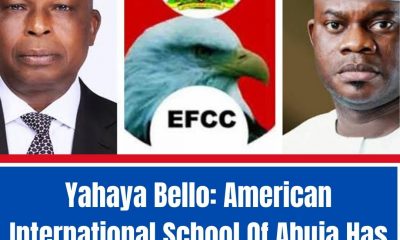
 News6 days ago
News6 days agoYahaya Bello: American International School Of Abuja Has Transferred $760,910.84 To EFCC Out Of $845,852
-
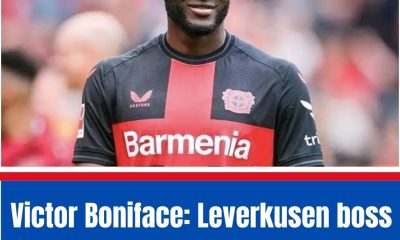
 Sports7 days ago
Sports7 days agoVictor Boniface: Leverkusen boss Alonso makes you ‘up your game’
-
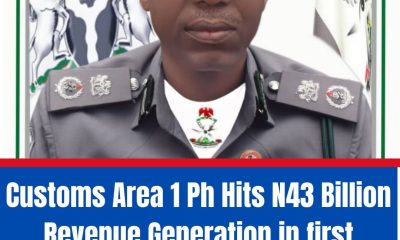
 Business7 days ago
Business7 days agoCustoms Area 1 Ph Hits N43 Billion Revenue Generation in first Quarter of 2024
-
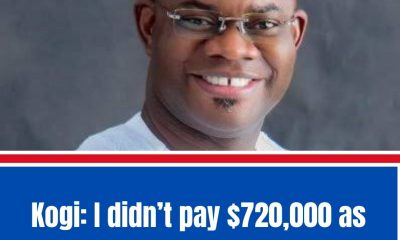
 Politics6 days ago
Politics6 days agoKogi: I didn’t pay $720,000 as school fees – Yahaya Bello
-
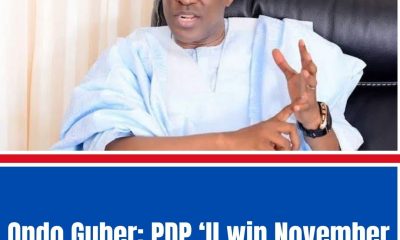
 Politics6 days ago
Politics6 days agoOndo Guber: PDP ‘ll win November election — Jegede
-

 News6 days ago
News6 days agoWhy people do strange, incredible things for love – Psychologist
-

 Entertainment6 days ago
Entertainment6 days agoDavido on earning $1.3 million after NY performance
-

 Politics6 days ago
Politics6 days agoGov Ododo reiterates commitment to weed criminals out of Kogi




